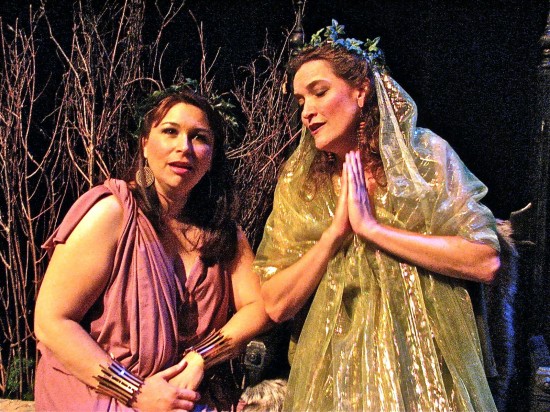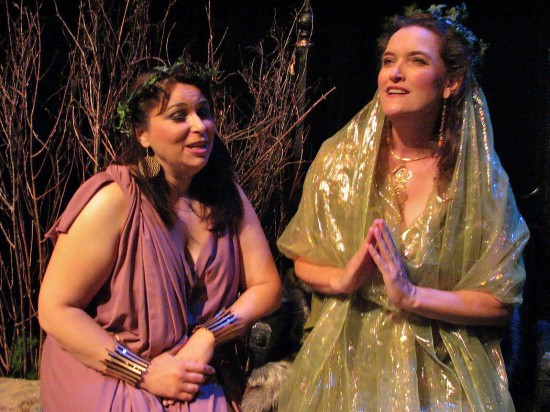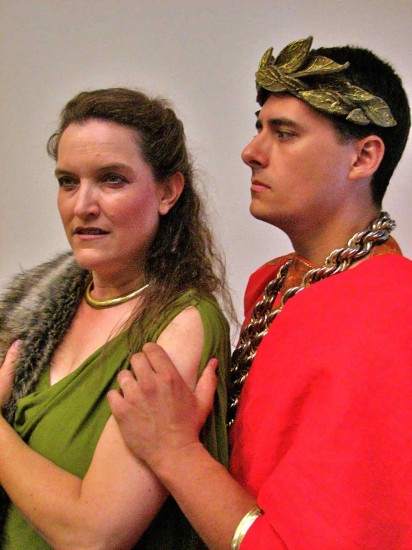The synopsis in the program starts by bringing us up to date: Norma, a much revered, awe-inspiring spiritual and political leader
of a small occupied nation in northern Europe that is chafing under the dominion of the all-powerful Roman empire and on the verge of revolution. Also a high priestess in an austere religious order whose vows include that of chastity, who would suspect that she is leading a double life, a secret life that amounts to no less than high treason?
She is in love with a leader of the enemy, and has even born him two children, a fact long kept secret, God only knows how. But a crisis is in the offing…
It’s the usual eternal triangle. Pollione (Robert Vann) , Consul of the Roman occupying force, lover of Norma (Elin Carlson), and father of her children has grown tired of Norma and fallen mutually in love with Adalgisa (Kathleen Moss), a young priestess who regards Norma as her mentor and role model. At the start, only Pollione knows what’s going on. Norma suspects he’s courting a younger woman, but has no idea who; Adalgisa is totally ignorant of the relationship of the other two.
Pollione has been called back to Rome and asks Adalgisa to renounce her vows and come with him.
Adalgisa, burdened by guilt for abandoning her religious ties, but carried away by passion, makes a tortured confession to her idol. In a lovely duet Norma is warmly sympathetic to her story, finding it startlingly similar to her own. Sympathetically she asks, “who is the lucky suitor?” – and all hell breaks loose.
Norma snaps. She accuses the younger woman of treachery and threatens all sorts of dire punishments. Adalgisa is horrified; she had no idea of her lover’s previous involvement with the Druids.
Pollione shows up, looking for Adalgisa to make plans for their elopement. When he sees the two women together he says “Oops!” but it’s too late. Both women spot him and the result is one of the most lovely trios in all opera. The three voices blend in delicious harmony – everyone singing, nobody listening. Pollione proclaims, “I follow love where’er it leads me; can I help it if love now leads me to the beautiful nubile teenager? I used to love Norma but you can’t expect that to continue since she’s become a hag and a nag (she might be all of 30!).” Norma tells Pollione, “Please take me back; I forgive you everything; I love you; please, please, please �.” And Adalgisa announces to everyone, “Don’t blame me; I didn’t know; it’s not my fault.” They might be at it yet, but a gong sounds telling Norma that coffee break is over and it’s time to get back to work and be a priestess. It’s also time for intermission.
When Act II begins, Norma has worked out a plan to solve the triangle. First, she will kill her two children a la Medea. This will keep them from living in slavery and disgrace and will be a great way to revenge herself on their father. Then she will kill herself, a la countless other grand opera heroines, thus gaining revenge on Adalgisa. Then, presumably, Pollione and Adalgisa can go off to Rome and live miserably and guiltily ever after.
She summons her personal slave Clotilde (Gail Simpson) to bring the sleeping children. The slave puts them down just out of sight at the edge of the stage (Pocket Opera doesn’t use excessive props) but remains on stage. Clotilde is just a bit part, but the expressive horror on Simpson’s face when she realizes Norma’s intentions brought more human reality to the scene than Norma’s violent actions. Norma raises the knife and time stands still �.
She can’t do it. Mother-instinct triumphs over revenge. Time for plan B.
Adalgisa is sent for. Norma tells her, “Look, kid. I know you two are nuts about each other, so go to him with my blessing. I only ask one thing in return: take my two children with you and raise them as your own.” Her acolyte replies, “No way. Now that I know what he did to you, I don’t want the scumbag. I’ve got a better scheme. I’ll go to him and persuade him that his honor, his sense of duty, and even his happiness depend on taking you back. Me? I just want to be a virgin priestess.”
Norma deludes herself that this Plan C will work and the scene ends with the two women beautifully singing and acting a duet to the effect that friendship is even better than love.

John Bischoff (Oroveso); photo courtesy Pocket Opera, © American Bach Soloists. All rights reserved.
Scene 2 is in the forest and gives the high priest, Oroveso (John Bischoff) a chance to show off his fine bass voice as he pleads with Norma to let him break the uneasy truce and kill all the Romans. “Not yet,” says Norma. “I’ll let you know when the gods declare the time is propitious.”
Things rapidly head to a climax. Norma finds out that Pollione rejected plan C and is even now planning to abduct Adalgisa and haul her off to Rome – willingly or not. Norma assumes falsely that Adalgisa betrayed her and totally loses her cool. She strikes the gong a mighty blow to summon the Druids. “It’s War!” she declares. “Fall on the Romans and kill them every one.” “Slow down a minute,” cautions Oroveso. “First we need a human sacrifice to propitiate the Gods.” As if on cue a couple of priests drag in Pollione whom they discovered in the holy temple – a crime automatically earning a death sentence. “The Gods are with us,” sings the crowd. “We need a victim and they provide us with the ideal one.”
“Wait,” says Norma. “I suspect there is more to this than meets the eye. I need to interview the prisoner alone. Scat.” When the stage has cleared she makes a final effort. “I’ll let you escape if you promise to totally forget about Adalgisa.” “No way,” says the Consul. “I’d rather die – so stab me and get it over with.” “Not yet. First I’ll kill Adalgisa,” and she bangs on the gong.
“I have discovered a vile plot. This Roman is but a dupe. We have been betrayed by one of our own – by a priestess! Her name is �”
(You know, that woman has an unlimited capacity for heading pell-mell to the brink of dastardly violence and suddenly stopping short and listening to her conscience.)
She stops her accusation to muse to the audience that there is no way she can accuse the innocent young acolyte of the very crime she, herself, is guilty of. “I’ve made such a mess of my own life that I’d better end it now, before I do any more harm �”
“Her name is � Norma! Yes, I am the guilty traitor.”
“Say it ain’t so,” sings the crowd. “How can I believe you? Recant your confession and we’ll forget all about it,” adds Oroveso. “No, Father, it’s all true” – and it turns out she uses the appellation in a filial sense, not a religious one. “Promise me one thing. Promise that you will look after my children after I am dead.” “I can’t do that; I am a priest. These children were conceived in the foulest of sins. They are abominations and must by killed or sold into slavery.” “You can’t mean that, Dad. No, I see a tear in your eye. Remember, they are your grandchildren.” Sure enough, Oroveso is as soft-hearted as his daughter – being a grampa totally trumps being a priest.
At which point Pollione is heard from again: “What nobility of character you have, Norma. You are my one true love – how could I have been so foolish as to think I loved another,” and they hold hands and happily walk off stage to be immolated on the sacrificial pyre so that they can die happily ever after.
What a wonderful afternoon of beautiful music, ever-growing tension, and glorious redemption. If you live nearby, go to the Berkeley Hillside Club on Sunday July 8 – your last chance to see it.
Photos: Action photos in color by Nicholas Aliaga
Black and white studio head shots courtesy Pocket Opera
This review by Philip G Hodge appeared in sanfranciscosplash.com on June 30, 2012.









